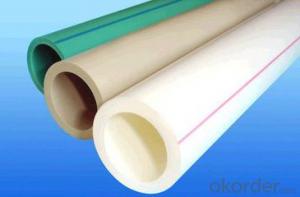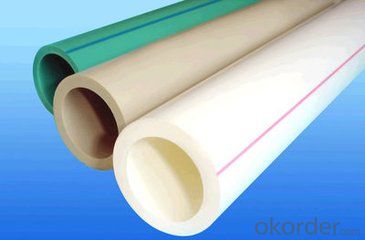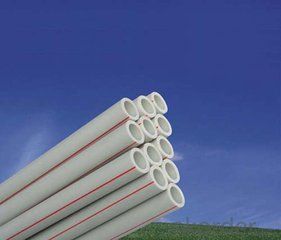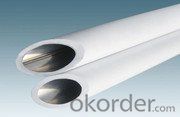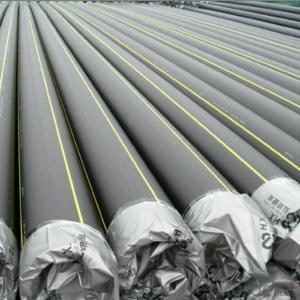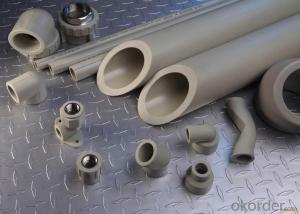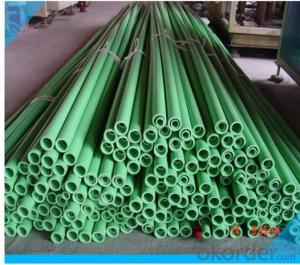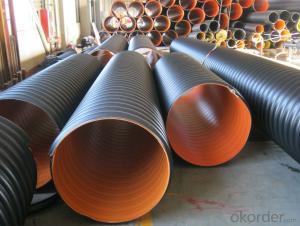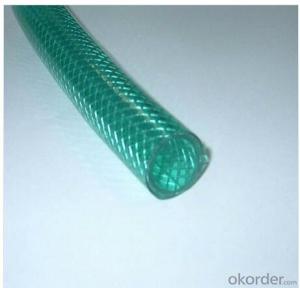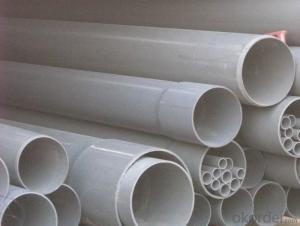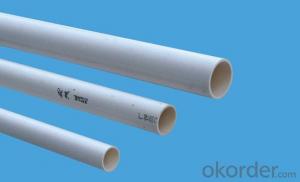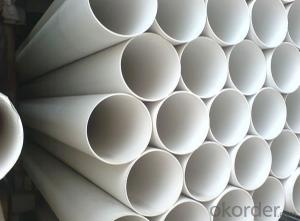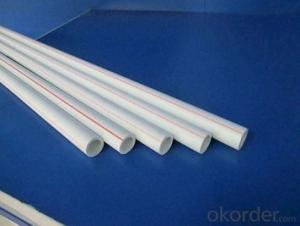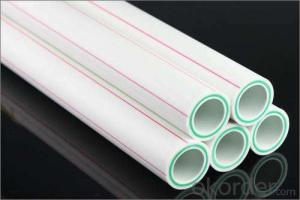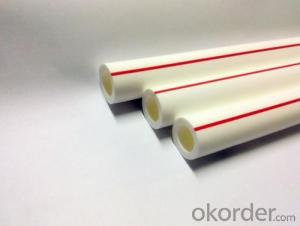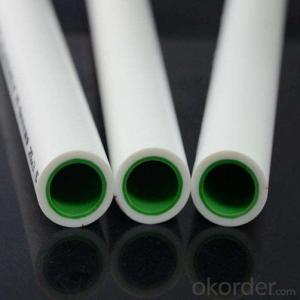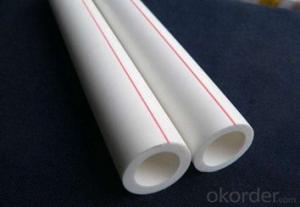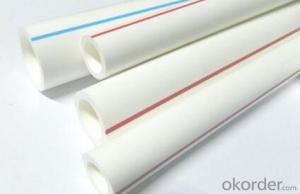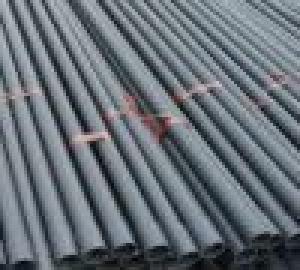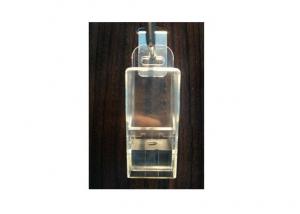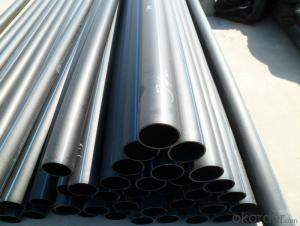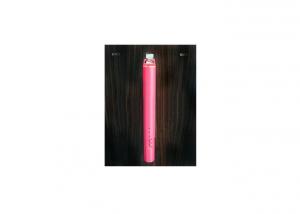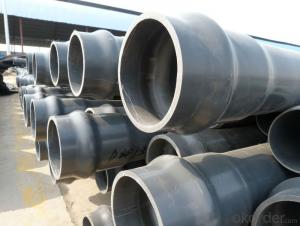Plastic Tubes - Heat Resistant PP-R Plastic Pipes for Agriculture
- Loading Port:
- China main port
- Payment Terms:
- TT OR LC
- Min Order Qty:
- 1000 m
- Supply Capability:
- 100000 m/month
OKorder Service Pledge
OKorder Financial Service
You Might Also Like
Quick Details
Material: PP-R, PPR
Technics: injection
Type: pipe
Place of Origin: China (Mainland)
Model Number: 20-110MM
Connection: Welding
Shape: Equal
Head Code: round
Product Type: Ppr pipe
Color: white, grey, green
Item number: DSE001-DSE010
Standard: DIN 8077/8078
Length: 4 meters
Certification: ISO9001, CE
PPR Pipes Advantages:
1. Sanitization & Non-poison: This product is green building material which is able to use for pure clean drinking water pipe system. No heavy metal additives would not be covered with dirt or contaminated by bacterium.
2. High Temperature Resistance: the maximum sustained working temperature is up to 70 Degrees Celsius, the maximum transient temperature is up to 95 Degrees Celsius.
3. Corrosion-Proof & Non-Fouling: Resist chemical matters or electron chemical corrosion. Able to avoid the pipe's fouling or blocking as well as the blemish, rust on basin and bath.
4. Heat Preservation & Energy-Saving: Excellent heat insulation features, minimal thermal conductivity which is only 0.5% of the conductivity of metal pipes.
5. Less Weight & High Strength: Its proportion is only 1/8th of metal pipe’s, with pressure-proof strength up to over 5MPa(50kg/sqcm),high tenacity and impact resistance.
6. Beautiful Appearance & Higher Flow Capacity:Smooth inner and outer surfaces, less flowing resistance, soft color and beautiful figure.
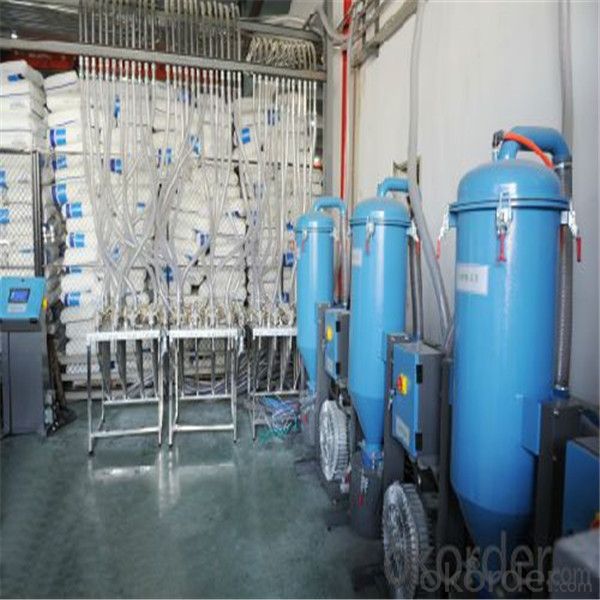
- Q: How are plastic tubes tested for quality and safety?
- Plastic tubes are tested for quality and safety through a series of rigorous procedures. These tests typically include visual inspections to ensure there are no visible defects or irregularities in the tubes. Additionally, mechanical tests are conducted to assess factors such as flexibility, durability, and resistance to pressure or impact. Chemical tests are also performed to confirm that the tubes are free from harmful substances and suitable for their intended use. Furthermore, the tubes may undergo tests for temperature resistance, UV stability, and potential leakage. Overall, these comprehensive testing methods help ensure that plastic tubes meet the necessary quality and safety standards before being used in various applications.
- Q: What material of buried pipeline needs to be treated with rust prevention? What kind of material needs to be treated with antiseptic, what kind of material is it made or not?
- Cast iron pipes and steel pipes need to be protected from corrosion. The rest are basically not needed, such as concrete pipes, plastic pipes, glass pipes, etc.;
- Q: How to measure the ends of a building with a transparent hose?
- The construction measure is often used in plastic pipe irrigation in horizontal pipe, using the principle of the connector of the connected device, both ends are open at both ends, water is the same height, close to the end of the elevation, the other end is close to the test site, slowly raise or drop action has a fixed elevation, when it has been on the elevation point the other end of the inside of the water level, height and elevation points are the same height.
- Q: Can plastic tubes be reused?
- Yes, plastic tubes can be reused depending on their condition and purpose. If they are clean and undamaged, they can be washed and used again for various applications such as packaging, storage, or transportation. However, it is important to consider the type of plastic and any specific regulations or guidelines for reuse to ensure safety and effectiveness.
- Q: How can I make a frosting tube?You know, the stuff you put frosting in squeeze it out?I want it to come out thin kind of so I can write Welcome homeCan't you like put it in a regular plastic baggy?But how do I make a nozel for it to come out of?...I need one within the next half hour. I Cannot go to the store fir anything..HELP
- They are both right! I just suggest you use a freezer bag, they are sturdier. I've used regular bags before only to have the seams pop half way through. Good luck!
- Q: Are plastic tubes suitable for structural applications?
- No, plastic tubes are generally not suitable for structural applications as they lack the strength and durability required to support heavy loads or withstand significant forces.
- Q: My mother is staying with me for a few weeks and was recently put on oxygen, which means a lot of clear plastic tubing. My one cat loves straws and rubberbands. I thought she was ignoring it but she chewed and ruined a long line. Does anyone have some behavioral techniques I can use to stop her from doing this? Thanks so much!
- I have the same problem, long term because i have the cats AND am the one on oxygen. I can tell you that I am still searching for a more ideal way, but there are two, and both are kind of involved: 1) rub the tubing with soap, especially hard soap, since it will stick. this works with all cords, because the cats will not lick at soap; 2) this won't work in the short term, but covering up the tubing with something like fabric will disguise it and the cats won't investigate further. i do both with my cats, though I will say that covering up the tubes actually works better, for some reason cats won't go after it when they don't see it, even if they know it is under the fabric. So i would try rubbing the tubing with soap, since your mom is already there, if you have the time and energy, but your mom is going to need extra tubing. it's really hard to keep cats away. i was hoping that someone would have given you a better answer than mine when i saw the question!
- Q: Can plastic tubes be used for pneumatic conveying?
- Yes, plastic tubes can be used for pneumatic conveying. Plastic tubes, such as PVC or polyethylene, are often used for pneumatic conveying applications due to their lightweight, durable, and corrosion-resistant properties. They can effectively transport bulk materials, powders, or granular substances through a pneumatic system with minimal friction and abrasion.
- Q: what do you call the plastic tubes used for pet water bottles, and where can you find them?
- rubber tubes? you can find them at any pet supply store.
- Q: How do plastic tubes compare to polyurethane tubes in terms of flexibility?
- Polyurethane tubes are generally more flexible than plastic tubes.
Send your message to us
Plastic Tubes - Heat Resistant PP-R Plastic Pipes for Agriculture
- Loading Port:
- China main port
- Payment Terms:
- TT OR LC
- Min Order Qty:
- 1000 m
- Supply Capability:
- 100000 m/month
OKorder Service Pledge
OKorder Financial Service
Similar products
Hot products
Hot Searches
Related keywords
